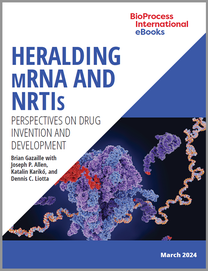eBook: Heralding mRNA and NRTIs — Perspectives on Drug Invention and DevelopmenteBook: Heralding mRNA and NRTIs — Perspectives on Drug Invention and Development
Sponsored by Bio-Rad Laboratories and Roche

Messenger RNA (mRNA) and nucleoside reverse-transcriptase inhibitors (NRTIs) represent two of today’s most discussed pharmaceutical modalities. The former drug class has become a household name because of its critical role in ameliorating the COVID-19 pandemic. People outside of the pharmaceutical industry are probably less familiar with NRTIs — although maybe more so with Biktarvy (emtricitabine), the blockbuster small-molecule drug developed in the thick of the human immunodeficiency virus (HIV)/acquired immunodeficiency syndrome (AIDS) pandemic. At first glance, mRNA-based vaccines and emtricitabine might seem to be a strange pairing for discussion. But a closer analysis reveals shared scientific, business, and legal challenges that the drugs’ inventors needed to overcome to bring such products to millions and even billions of people worldwide.
In this eBook, BPI’s managing editor speaks with Nobel Prize laureate Katalin Karikó (coinventor of nucleoside-modified mRNA technology) and Dennis C. Liotta (coinventor of emtricitabine) to learn about their difficulties in translating innovative pharmaceutical modalities from basic research to drug development and ultimately commercialization. Meanwhile, intellectual property advocate Joseph P. Allen provides insight into the legal conditions that enable drug innovation in the United States, focusing especially on the Bayh–Dole Act for patents based on government-funded discoveries. Together, Kariko, Liotta, and Allen underscore the difficulty of pharmaceutical invention and explore how legislation for decentralized technology management enables innovation in the US context. Their stories also shed light on personal drivers and professional barriers that influenced R&D for some of today’s most critically important drug products.
Fill out the form below to read the full eBook now.
You May Also Like





